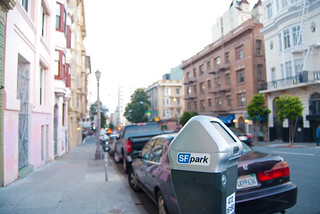In a setback for progressive parking policy in San Francisco, the Board of Supervisors voted last week to eliminate the SFMTA’s ability to install any significant amount of new parking meters under a new five-year contract to upgrade existing meters.
The $54 million contract originally covered 25,000 parking meters that accept credit cards and multiple forms of payment to replace existing meters, plus 10,000 for backup stock and some potential expansions, which would require a separate public planning process before installation. But supervisors appear to be going along with the anti-meter campaign led by Supervisor Mark Farrell, amending the contract to remove half of the additional 10,000 meters. SFMTA Director Ed Reiskin said that only leaves room for the agency to fill “very small-scale requests” for new meters from merchants.
Livable City Executive Director Tom Radulovich called the supervisors’ stance “disappointing”:
Parking meters are essential to San Francisco's policy of prioritizing on-street parking for local merchants and residents before drive-alone commuters. As land uses diversify across the eastern neighborhoods of the city, there will continue to be a need for new metered areas to ensure that commuter parking not displace the short-term parking that supports neighborhood-serving businesses. A cap on parking meters will limit MTA's ability to manage on-street parking for the benefit of local merchants and their customers.
No supervisors opposed reducing the number of meters to be purchased in the contract. Supervisor John Avalos, who introduced the contract amendment, said the SFMTA is expected to allocate the 5,000 additional meters like so: 1,200 to replace meters on Port property, 2,800 to replace damaged meters, and 1,000 “to be used as a maintenance flow.”
“There will be no expansion of meters,” said Avalos. “If that’s gonna happen, it’ll be another go-around from the MTA to describe how they will implement and with a lot of outreach to the public.”
Even though SFMTA officials stated in no uncertain terms that the location of any significant expansion of meters could only be initiated through a publicly-vetted planning process, supervisors unanimously approved the amendment, citing a lack of confidence in the SFMTA’s outreach process. The SFMTA Board of Directors voted last week to require more stringent outreach measures for new parking meters.
The lone vote against the contract from Supervisor Jane Kim apparently wasn’t intended as a stand for rational parking policy. Instead, Kim said she wanted the contract to include provisions that would bind the SFMTA to adhere to its allocation plan for the meters -- an authority that the Board of Supervisors doesn’t have, according to the City Attorney.
“There has been a lot of consternation from our city residents about how we do parking meter installation,” said Kim, who bemoaned the fact that meters go into effect at 7 a.m. in the Tenderloin (rather than the typical 9 a.m.), which has one of the lowest rates of car ownership in the city. She did say, however, that “I do think that there is a very valid argument as to the fact that we charge people for Muni, so we should charge people for parking.”
Supervisor Farrell, who has vehemently opposed charging drivers to store their cars on public streets, said he was satisfied with the contract as amended. “I don’t like paying at all, but if I have to, I’d rather pay with a credit card than through the old meters, so I think it’s a step in the right direction,” he said.
Supervisors Farrell and Malia Cohen had already made their anti-meter stances well known. With this contract, supervisors who have otherwise stood out as leaders on progressive transportation policy joined them. Supervisor London Breed said she doesn’t “want to wake up one morning, and all of the sudden, two, three, four blocks in my neighborhood have meters,” a sentiment echoed by Supervisor Norman Yee.
“We don’t necessarily go into the neighborhood with a plan to already place meters there, obtain community input, and place the meters there anyway,” said Breed. “I think we’re kind of venturing out past the territory of commercial areas, and places where meters were meant to be, into residential areas, where they should never be. I want to make sure we’re not heading down that road.”
Breed also revealed her stance on the expansion of meter hours to Sundays, which was implemented at the start of the year, when she took office. “I don’t know why” that policy was adopted, she said.
Reiskin said the supervisors would have to vote to modify the contract for the SFMTA to add any other meters within the next five years. “We certainly wouldn’t be able to do anything on the scale of what we had originally proposed, for example, for the northeast Mission,” he said.
Supervisor Scott Wiener said “there are times when meters do make sense,” and that the upgrade to meters that accept credit cards is long overdue. Wiener also pointed out that he’s heard of a case in which the SFMTA rejected a merchant’s request for meters. “It’s a bit more of a nuanced issue than people sometimes perceive,” he said.
As Radulovich noted, “limiting parking meters will mean more congestion, and more pollution” as drivers circle endlessly for a free parking spot in neighborhoods where demand exceeds supply.
“San Francisco must be a leader on climate protection, and parking management has so far been one of San Francisco's sustainable transportation successes,” he wrote. “It's sad that the Supes showed so little environmental awareness and leadership last week.”





